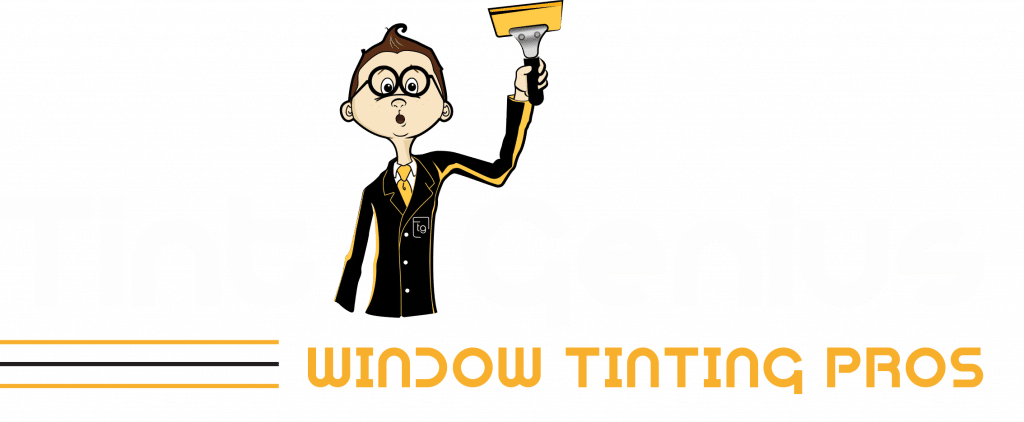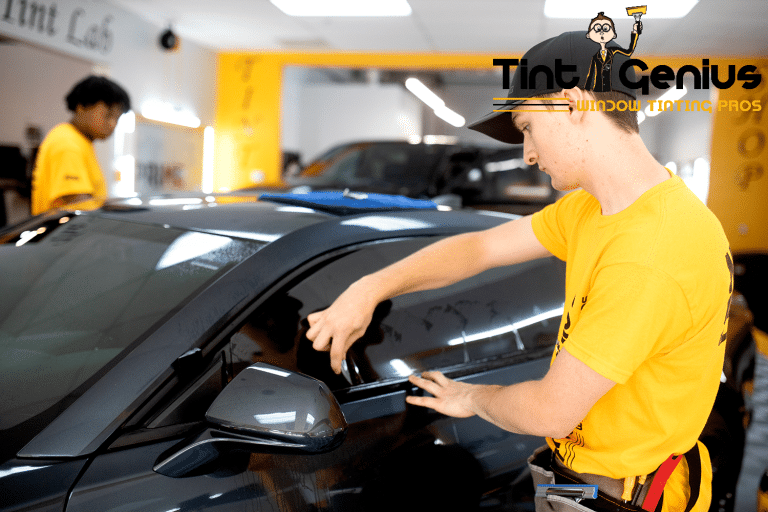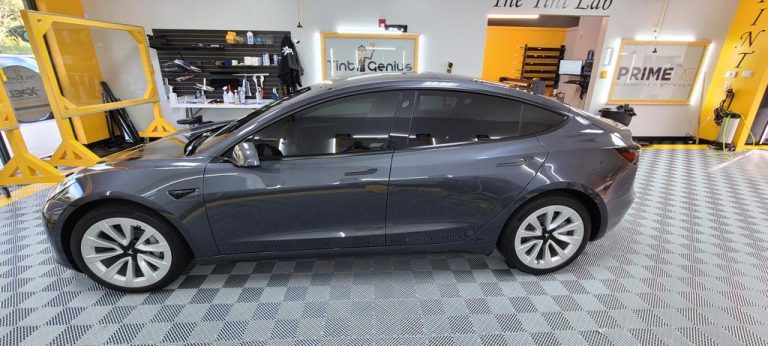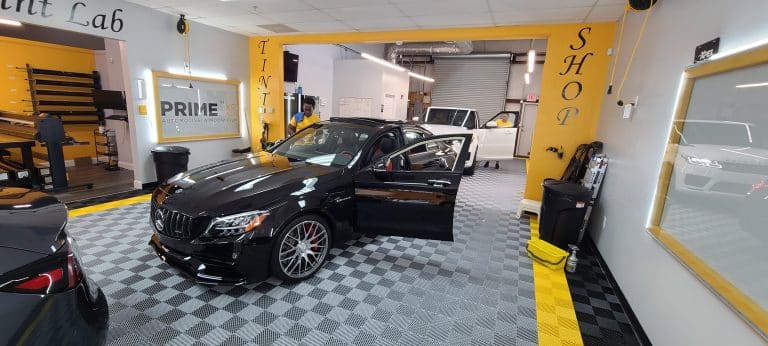Benefits of Commercial Window Tinting: Enhance Energy Efficiency and Privacy
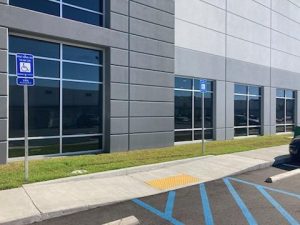
For many business owners, managing operational costs and maintaining a secure environment for their employees are essential daily tasks. High energy bills and concerns over sensitive information visible through windows can be stressful. Consider walking into your office and immediately feeling the warmth from too much sunlight pouring in. It’s discomforting, not just for you but also for your entire staff.
This is where commercial window tinting offers an unexpected but efficient solution. Research shows that window tinting can reduce solar heat gain by up to 79%, drastically cutting cooling costs while also enhancing privacy. Imagine transforming your office into a more secure and comfortable space without sacrificing natural light. Let’s dive into how this simple change can bring significant benefits, starting with improving privacy and security in your workspace.
Commercial window tinting offers several significant benefits, including enhanced energy efficiency by reducing solar heat gain, improved privacy for sensitive business environments, and protection against harmful UV rays that can fade furnishings. Additionally, it can minimize glare, increase security against break-ins, and improve the overall aesthetics of your property while providing a long-term solution to reduce costs on energy bills.
Enhanced Privacy and Security
The role of window tinting in commercial settings goes beyond aesthetics; it serves a paramount function in maintaining privacy. For instance, think about a busy law firm situated on a bustling street. Clients often want to discuss sensitive matters, but traditional glass windows offer zero confidentiality. This is where reflective window films come into play. They obscure outsiders’ views while still allowing natural light to flood the interior spaces, creating an environment that is both bright and welcoming. This effective barrier becomes invaluable for preserving confidentiality without sacrificing comfort.
Consider the comfort level of your clients—enhanced privacy can significantly improve their experience. But enhanced privacy isn’t the only benefit; the installation of certain types of window tints also enhances security. These security films bolster glass against potential intruders. Imagine it this way: without added protection, a simple rock thrown toward a window could lead to significant losses—not just monetarily but also reputationally. By reinforcing the material of the glass itself, businesses create a formidable first line of defense against break-ins, which can deter would-be burglars and instill confidence among employees and clients.
In addition, window tinting mitigates risks associated with vandalism. A store or office located in an area prone to such incidents can greatly benefit from tinted windows that resist shattering, thus preventing damage and potential theft. By providing both privacy and increased security, businesses safeguard sensitive information and protect valuable assets.
While enhancing privacy and security are compelling reasons for incorporating window tinting, these benefits tie closely to broader themes of efficiency and cost-effectiveness that deserve exploration.
Energy Efficiency and Cost Savings
When it comes to enhancing energy efficiency in commercial spaces, window tinting serves as a remarkable tool. Consider this fact: window films can reduce solar heat gain by up to 79%. This reduction means that businesses will rely less on their air conditioning systems—especially during those hot summer months—leading to substantial decreases in cooling costs. Many organizations experience savings of up to 30% on cooling expenses, translating into considerable financial benefits over time.
Moreover, by reducing reliance on heating and cooling systems, businesses not only save money but also contribute to environmental sustainability. Lower energy consumption leads to reduced carbon footprints, making tinted windows a dual asset for both budgets and the planet. While installing window film involves an initial investment, the long-term benefits outweigh this upfront cost. High-quality window tints can last up to 10 years or more with proper care, allowing companies to recapture their expenditures within months through lowered utility bills.
As energy costs continue to rise, the importance of proactive measures becomes clear. Transitioning further, we will explore how window tinting provides additional protection against harmful UV rays that can damage interiors.
UV Protection for Interiors
The harmful UV rays penetrating through windows present a silent menace that can wreak havoc on your interior spaces. Commercial window tinting stands as a formidable barrier against these rays, and its benefits extend well beyond just energy savings. In fact, research shows commercial window films can block up to 99% of harmful UV rays, a statistic endorsed by The Skin Cancer Foundation. This high level of protection is crucial, particularly in environments where employees or customers spend significant amounts of time indoors.
Damage from UV exposure isn’t simply a concern for skin health; it can result in substantiated degradation of valuable assets within commercial spaces. Just think about how much time and money goes into furnishing an office or curating attractive displays in retail settings. Excessive UV exposure leads to fading and deterioration of carpets, furniture, artwork, and even electronic devices over time. By installing window tinting, you can effectively prolong the lifespan of these investments.
A perfect example lies in the retail industry. Imagine a boutique shop filled with vibrant clothing and elegant accessories. These items are targets for fading when exposed to harsh sunlight day after day. The last thing any retail owner wants is for their merchandise to lose its luster or become unsellable due to sun damage. Window tinting acts as an effective shield, enabling the retailer to keep items looking sharp and fresh while preserving their value.
By reducing overall UV exposure, window films do more than preserve aesthetics—they enhance the longevity of products, ensuring retailers maximize their return on investment while maintaining an inviting shopping atmosphere.
As we transition to examine further advantages of window tinting, the impact on glare reduction is another significant factor that contributes to a comfortable environment for staff and visitors alike.
Glare Reduction and Comfort
The issue of glare in office settings is more than just an inconvenience; it can impact productivity and overall employee well-being. Glare from sunlight reflecting off screens creates distractions, often leading to eye strain and discomfort. Fortunately, commercial window tinting is an effective solution to this prevalent problem. By applying a specialized film to windows, businesses can significantly reduce the intensity of incoming light without sacrificing natural illumination.
Practical Application
For office spaces with large windows or exposures directly facing the sun, investing in window films can prove invaluable. These films act as a barrier by filtering sunlight effectively, allowing employees to work comfortably throughout the day. This practice leads to a noticeable enhancement in focus and efficiency. A study indicated that more than 70% of office workers experience visual discomfort due to glare, which can lead to a decrease in productivity by about 20%. Reducing glare not only makes the work environment more pleasant but also helps employees perform at their best.
Moreover, the commercial window tinting benefits extend beyond comfort; they also enhance energy efficiency within the workspace. As we consider further advantages, it’s clear that maintaining an optimal indoor climate is essential for both productivity and savings. Let’s take a closer look at how proper window treatments contribute to this aspect.
Temperature Regulation
Maintaining a consistent and comfortable temperature in an office space can often feel like a never-ending battle against the elements. One day it’s too hot, and the next it’s unbearably cold. However, commercial window tinting offers an effective solution by acting as insulation. During the summer months, window films can significantly reduce the amount of heat that enters through the glass, ensuring that your workspace remains pleasantly cool. Conversely, when winter rolls around, these same films help retain internal heat, creating a cozy atmosphere even on the chilliest of days.
This dual functionality means that businesses located in temperate climates reap the benefits year-round. It’s not just about comfort; this kind of temperature regulation can create significant savings. You can imagine how frustrating it is to crank up the air conditioning in the summer only to watch your energy bills soar. Studies indicate that window tinting can lower energy costs by as much as 30%, thanks to reduced reliance on heating and cooling systems to maintain comfortable working conditions.
Window tinting not only optimizes comfort levels but also paves the way for improved productivity while contributing positively to your company’s financial health. Exploring additional economic advantages will further highlight why investing in this technology is a wise decision.
Long-Term Economic Benefits
Beyond immediate cost savings, commercial window tinting is increasingly becoming an investment that pays dividends over time.
One of the most compelling financial advantages is the increased property value. When a property boasts enhanced energy efficiency features such as window tinting, it not only looks modern and appealing but also possesses higher market value. Real estate agents often emphasize this aspect, indicating that prospective buyers are drawn to properties that promise lower operational costs.
Moving on from just aesthetics, the durability and maintenance cost reduction associated with quality window films play a significant role in long-term savings. Investing in high-quality tinted films means you’re choosing a product with a lifespan that can easily exceed a decade. This durability translates to minimal maintenance costs over the years, allowing business owners to focus their resources elsewhere rather than worrying about frequent replacements or touch-ups. The weather-resistant properties of these films mean they withstand harsh elements effectively, preserving both functionality and appearance.
But perhaps the most striking metric is the return on investment (ROI) that comes from installing window tint. Given the multiple avenues for savings—including energy reductions, increased productivity due to improved workplace comfort, and decreased maintenance expenses—the ROI for commercial window tinting is undeniably significant. To illustrate this impact succinctly, consider the following table that breaks down estimated costs balanced against annual savings:
| Factor | Average Investment/Cost | Savings/Year | ROI Timeframe |
| Initial Installation | $5,000 | $2,000 | 2.5 years |
| Energy Cost Reduction | N/A | $1,500 | Immediate |
| Maintenance Savings | N/A | $300 | Immediate |
| Increased Productivity (value) | N/A | $3,000 | Immediate |
This data reveals how quickly businesses can expect to recuperate their initial investments through diminished expenses and enhanced productivity.
In summary, investing in window tinting emerges as a clear winner—offering not just momentary relief in energy bills but establishing lasting fiscal benefits that enhance both property value and day-to-day operational efficiency.
To explore how commercial window tinting can benefit your business, visit us at Tint Genius or call us at 678-609-6005.
